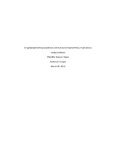| dc.rights.license | In Copyright | en_US |
| dc.creator | Zankman, Emily Lauren | |
| dc.date.accessioned | 2013-04-10T15:32:47Z | |
| dc.date.available | 2013-04-10T15:32:47Z | |
| dc.date.created | 2013 | |
| dc.identifier | WLURG38_Zankman_PHIL_2013 | |
| dc.identifier.uri | http://hdl.handle.net/11021/23845 | |
| dc.description | Thesis; [FULL-TEXT FREELY AVAILABLE ONLINE] | en_US |
| dc.description | Emily Lauren Zankman is a member of the Class of 2013 of Washington and Lee University. | en_US |
| dc.description.abstract | . . . I will now provide a quick roadmap of my thesis. In the first section, I will begin by explaining the notion of anthropocentrism and noting why environmentalists have felt the need to respond by proposing increasingly morally extensive theories. Next, I explain and critique each theory on the extensionist continuum. In the third section, I will propose an enlightened anthropocentric approach in which each decision that has an environmental impact must take into account moral obligations to current and future generations, the full value of ecosystem services, and aesthetic value. Within this section, I will consider and respond to possible objections to an enlightened anthropocentrist theory. Afterwards, in the fourth section of my thesis, I will illustrate how this philosophical framework can be successfully translated into policy making. To do this, I will first outline the typical environmentalist's agenda. Then, I will examine agricultural practices in the Chesapeake Bay watershed to demonstrate how, when taking into account all of the pillars of the enlightened anthropocentric ethic, policymakers can justify the pursuit of the applicable environmentalist policy objectives. Essentially, I will argue that approaching environmental ethics from an enlightened anthropocentric view captures a majority of the traditional values associated with the environmental movement without the counter-intuitiveness of the more inclusive approaches. [from initial paragraphs] | en_US |
| dc.description.statementofresponsibility | Emily Zankman | |
| dc.format.extent | 53 pages | en_US |
| dc.language.iso | en_US | en_US |
| dc.rights | This material is made available for use in research, teaching, and private study, pursuant to U.S. Copyright law. The user assumes full responsibility for any use of the materials, including but not limited to, infringement of copyright and publication rights of reproduced materials. Any materials used should be fully credited with the source. | en_US |
| dc.rights.uri | http://rightsstatements.org/vocab/InC/1.0/ | en_US |
| dc.subject.other | Washington and Lee University -- Honors in Philosophy | en_US |
| dc.title | Enlightened Anthropocentrism and its Environmental Policy Implications (thesis) | en_US |
| dc.type | Text | en_US |
| dcterms.isPartOf | RG38 - Student Papers | |
| dc.rights.holder | Zankman, Emily Lauren | |
| dc.subject.fast | Anthropomorphism | en_US |
| dc.subject.fast | Environmental policy | en_US |
| dc.subject.fast | Philosophy | en_US |
| dc.subject.fast | United States--Chesapeake Bay Region | en_US |
| local.department | Philosophy | en_US |
| local.scholarshiptype | Honors Thesis | en_US |
